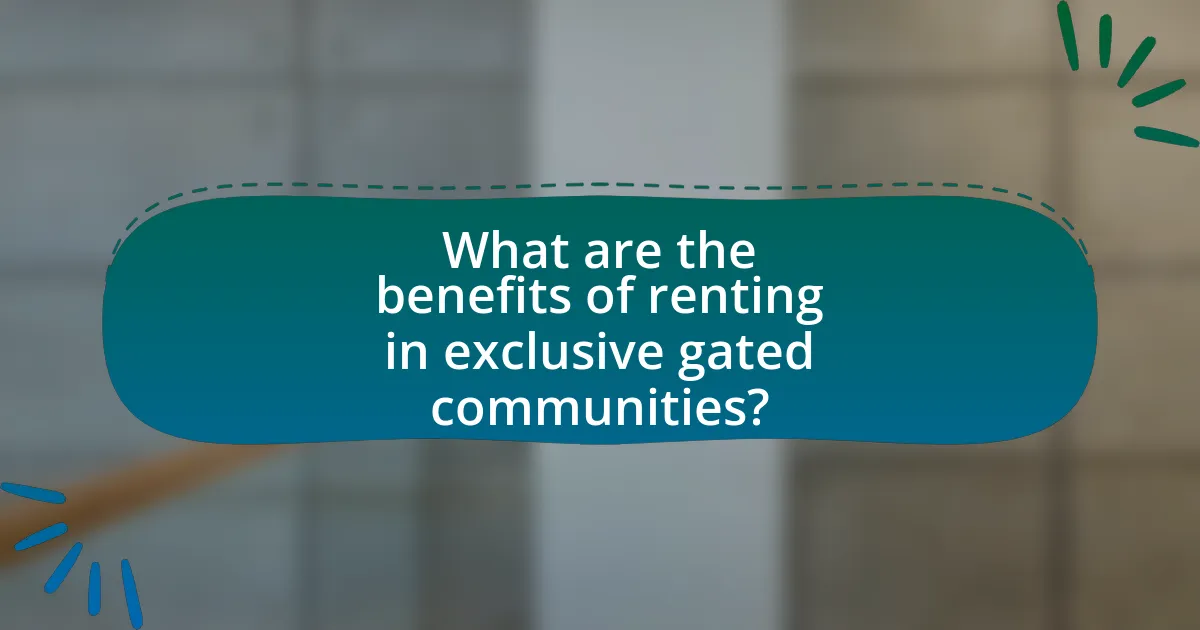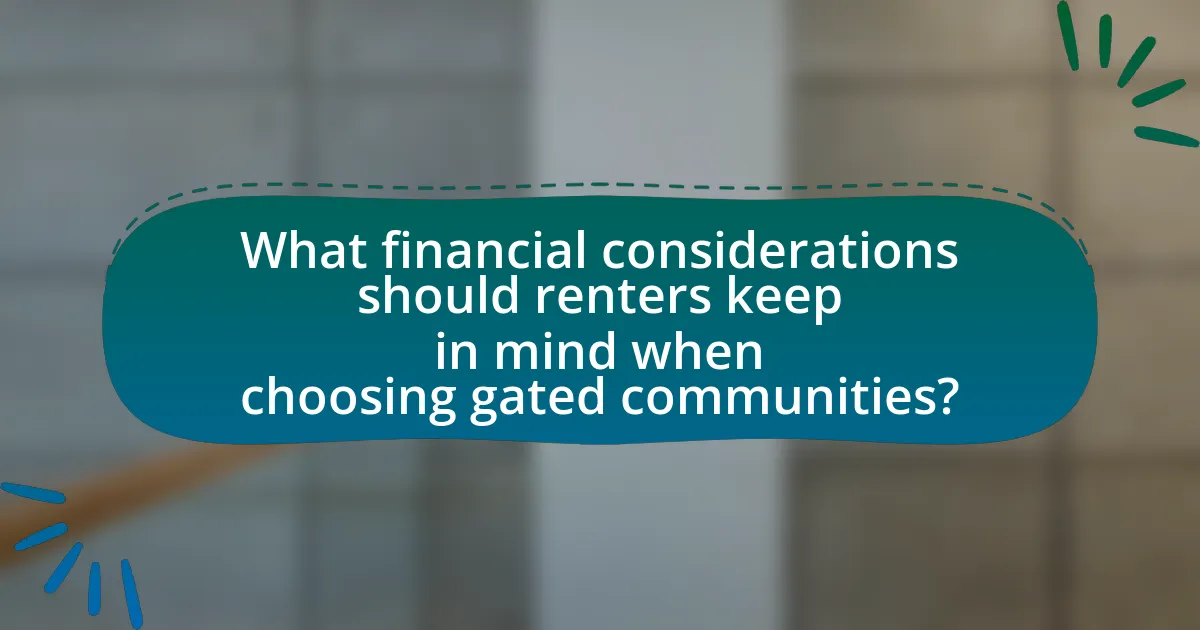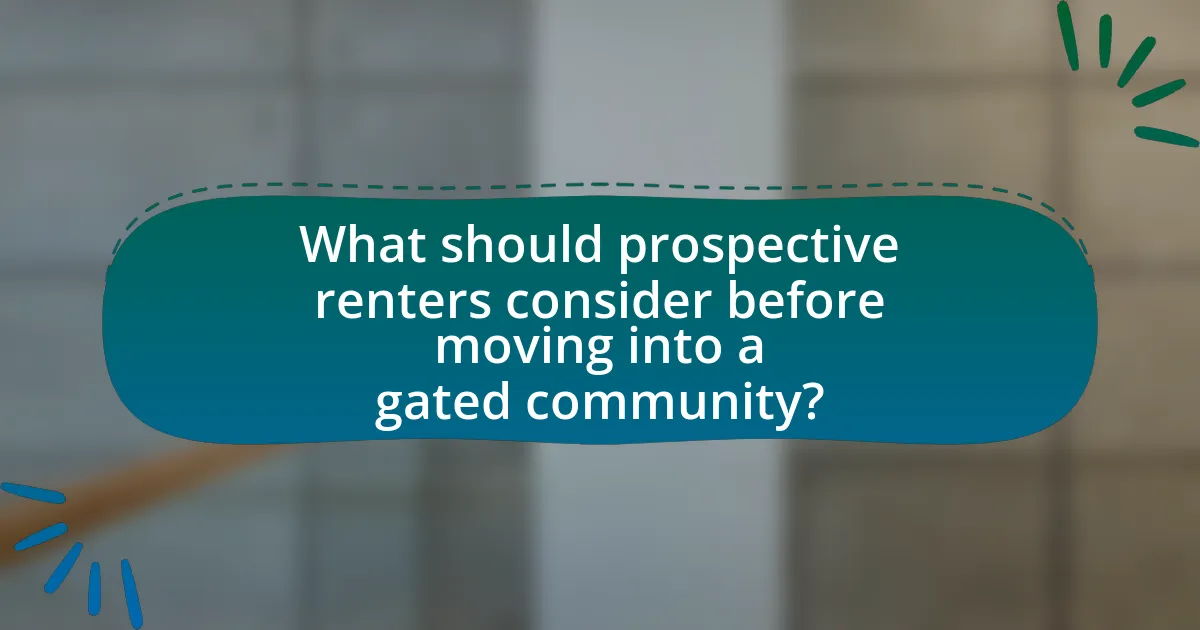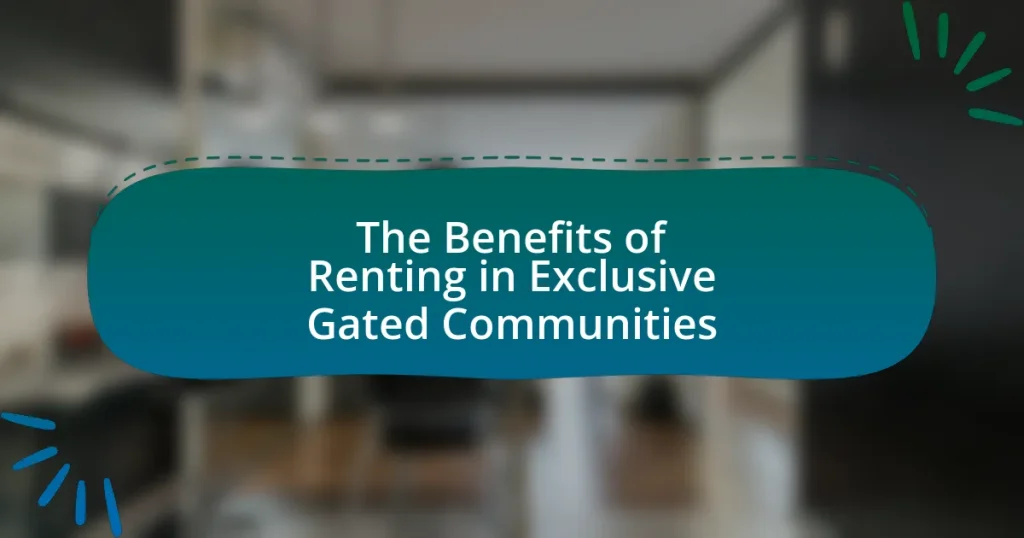Renting in exclusive gated communities provides numerous advantages, including enhanced security, privacy, and access to premium amenities. These communities typically feature controlled access points, surveillance systems, and on-site security personnel, which significantly reduce crime rates and foster a safer living environment. Additionally, residents benefit from recreational facilities such as pools, fitness centers, and parks, promoting an active lifestyle and community engagement. The article also explores the financial considerations of renting in these communities, including higher rental costs and potential long-term property value appreciation, as well as the importance of location and community regulations in the renting experience.

What are the benefits of renting in exclusive gated communities?
Renting in exclusive gated communities offers enhanced security, privacy, and access to premium amenities. These communities typically feature controlled access points, security personnel, and surveillance systems, significantly reducing the risk of crime. Additionally, residents enjoy a sense of community and exclusivity, often benefiting from amenities such as pools, fitness centers, and landscaped parks, which are maintained to high standards. Studies indicate that properties in gated communities often retain higher property values due to their desirability and the perceived safety they provide.
How do exclusive gated communities enhance security for renters?
Exclusive gated communities enhance security for renters by implementing controlled access points and surveillance systems. These communities typically feature gated entrances that require residents and authorized visitors to pass through security checkpoints, significantly reducing unauthorized entry. Additionally, many gated communities utilize surveillance cameras and security personnel to monitor activities, further deterring criminal behavior. According to a study by the National Institute of Justice, neighborhoods with enhanced security measures, such as gated access and surveillance, experience lower crime rates compared to those without such features. This combination of physical barriers and active monitoring creates a safer living environment for renters.
What security features are commonly found in gated communities?
Gated communities commonly feature security measures such as controlled access points, surveillance cameras, and security personnel. Controlled access points, often equipped with gates and entry systems, restrict entry to authorized residents and guests, enhancing safety. Surveillance cameras monitor the premises, providing real-time footage that can deter criminal activity and assist in investigations. Additionally, on-site security personnel patrol the area, offering immediate response to incidents and maintaining a visible security presence. These features collectively contribute to a safer living environment, making gated communities appealing for residents seeking enhanced security.
How does the presence of security personnel impact renter safety?
The presence of security personnel significantly enhances renter safety by providing a visible deterrent to crime and ensuring rapid response to incidents. Studies indicate that properties with security staff experience lower crime rates; for instance, a report by the Urban Institute found that neighborhoods with active security measures saw a 30% reduction in property crimes. This presence fosters a sense of security among renters, leading to increased satisfaction and community cohesion.
What lifestyle advantages do renters experience in gated communities?
Renters in gated communities experience enhanced security, privacy, and access to amenities. The controlled access and surveillance systems in these communities significantly reduce crime rates, providing a safer living environment. Additionally, many gated communities offer recreational facilities such as pools, gyms, and parks, promoting a more active lifestyle. According to a study by the Urban Institute, residents in gated communities report higher satisfaction levels due to these amenities and the sense of community fostered by shared spaces.
How do amenities in gated communities contribute to a better living experience?
Amenities in gated communities significantly enhance the living experience by providing residents with convenience, security, and recreational opportunities. These amenities, such as swimming pools, fitness centers, parks, and clubhouses, foster a sense of community and promote an active lifestyle. For instance, a study by the National Association of Realtors found that 70% of homebuyers prioritize community amenities when selecting a residence, indicating their importance in enhancing quality of life. Additionally, gated communities often feature enhanced security measures, which contribute to residents’ peace of mind and overall satisfaction. Thus, the combination of convenience, community engagement, and security provided by amenities in gated communities leads to a superior living experience.
What recreational opportunities are available to renters in these communities?
Renters in exclusive gated communities typically have access to a variety of recreational opportunities, including swimming pools, fitness centers, tennis courts, and walking trails. These amenities are designed to enhance the lifestyle of residents, providing spaces for exercise, relaxation, and social interaction. For example, many gated communities feature well-maintained parks and playgrounds, which cater to families and promote outdoor activities. Additionally, some communities may offer organized events and activities, fostering a sense of community among renters.
How does renting in gated communities affect social interactions?
Renting in gated communities generally enhances social interactions among residents due to the controlled environment and shared amenities. These communities often foster a sense of belonging and security, which encourages residents to engage with one another. For instance, common areas such as pools, parks, and clubhouses provide opportunities for socializing, leading to increased community involvement. Research indicates that residents in gated communities report higher levels of social cohesion and neighborly interactions compared to those in non-gated areas, as the design and structure of these communities promote regular encounters and shared experiences.
What community events are typically organized in gated communities?
Gated communities typically organize a variety of community events such as holiday celebrations, barbecues, fitness classes, and social gatherings. These events foster a sense of community and encourage interaction among residents. For instance, many gated communities host annual holiday parties that bring families together, enhancing neighborly relationships. Additionally, fitness classes like yoga or aerobics are often scheduled in common areas, promoting health and wellness among residents. Such organized activities not only create a vibrant community atmosphere but also contribute to the overall appeal of living in gated communities.
How does the neighborhood design foster a sense of community among renters?
Neighborhood design fosters a sense of community among renters by incorporating shared spaces and amenities that encourage interaction. Features such as parks, community centers, and walking paths promote social engagement, allowing residents to connect with one another. Research indicates that neighborhoods with accessible communal areas see a 25% increase in social interactions among residents, enhancing community bonds. Additionally, well-planned layouts that prioritize pedestrian access over vehicle traffic create safer environments for residents to gather and socialize, further strengthening community ties.

What financial considerations should renters keep in mind when choosing gated communities?
Renters should consider the higher rental costs associated with gated communities, which often include additional fees for amenities and security. These communities typically charge a premium for enhanced safety, privacy, and exclusive facilities, which can significantly increase monthly expenses. For example, a study by the National Association of Realtors indicates that properties in gated communities can command rental prices that are 10-20% higher than similar non-gated properties. Additionally, renters should evaluate the potential for increased utility costs due to shared amenities and the impact of homeowners’ association fees, which can range from $100 to $500 monthly, depending on the community. Understanding these financial implications is crucial for renters to ensure they can afford the overall cost of living in a gated community.
How do rental prices in gated communities compare to other housing options?
Rental prices in gated communities are generally higher than those of other housing options. This price difference is attributed to the added amenities, security features, and exclusivity that gated communities offer. For instance, a study by the National Association of Realtors indicates that properties in gated communities can command rental prices that are 10% to 30% above comparable non-gated properties, reflecting the perceived value of enhanced safety and community features.
What factors influence the rental costs in exclusive gated communities?
Rental costs in exclusive gated communities are influenced by several key factors, including location, amenities, security features, and property size. The desirability of the location significantly impacts rental prices; properties in affluent neighborhoods or near urban centers typically command higher rents. Amenities such as swimming pools, fitness centers, and clubhouses also contribute to increased rental costs, as they enhance the living experience. Security features, including gated access and surveillance systems, provide peace of mind and can justify higher rental rates. Additionally, the size and condition of the property play a crucial role; larger, well-maintained homes generally attract higher rents compared to smaller or less maintained units. These factors collectively determine the rental market dynamics within exclusive gated communities.
Are there additional fees associated with renting in gated communities?
Yes, there are additional fees associated with renting in gated communities. These fees often include homeowners association (HOA) dues, which cover maintenance of common areas, security services, and amenities such as pools or gyms. According to the Community Associations Institute, approximately 74 million Americans live in communities governed by HOAs, and the average monthly fee can range from $200 to $400, depending on the community’s services and amenities.
What are the potential long-term financial benefits of renting in gated communities?
Renting in gated communities can provide long-term financial benefits such as increased property value stability and lower insurance costs. Gated communities often maintain higher property values due to their exclusive nature and amenities, which can lead to a more stable rental market. Additionally, the presence of security features and community management can result in lower homeowner’s insurance premiums, as properties in these areas are often considered less risky. According to a study by the National Association of Realtors, homes in gated communities appreciate at a rate of 5-10% higher than those in non-gated areas, reinforcing the financial advantages of renting in such environments.
How can renting in a gated community affect property value appreciation?
Renting in a gated community can positively affect property value appreciation due to the perceived desirability and exclusivity of such neighborhoods. Properties in gated communities often experience higher demand because they offer enhanced security, amenities, and a controlled environment, which can lead to increased property values over time. For instance, a study by the National Association of Realtors found that homes in gated communities can appreciate at rates 5-10% higher than similar homes in non-gated areas, primarily due to the added appeal of safety and community features.
What are the implications for renters regarding lease agreements in gated communities?
Renters in gated communities face specific implications regarding lease agreements, primarily centered around restrictions and additional fees. Lease agreements in these communities often include clauses that enforce community rules, such as restrictions on pet ownership, noise levels, and modifications to the property. Additionally, renters may be required to pay extra fees for amenities and security services that are part of the gated community, which can increase overall housing costs. These agreements typically emphasize compliance with community standards, which can limit renters’ autonomy compared to non-gated properties.

What should prospective renters consider before moving into a gated community?
Prospective renters should consider the security features and community regulations of a gated community before moving in. Gated communities often provide enhanced security measures, such as controlled access points and surveillance systems, which can lead to a safer living environment. Additionally, these communities typically have specific rules and regulations that govern resident behavior, maintenance standards, and property modifications, which can impact renters’ lifestyles and responsibilities. Understanding these aspects is crucial, as they directly influence the overall living experience and satisfaction within the community.
What are the key features to look for in a gated community rental?
Key features to look for in a gated community rental include security measures, amenities, location, and community regulations. Security measures such as gated access, surveillance cameras, and on-site security personnel enhance safety for residents. Amenities like swimming pools, fitness centers, and parks provide recreational options and foster a sense of community. The location should offer convenient access to schools, shopping, and transportation, which adds to the desirability of the rental. Community regulations, including noise restrictions and maintenance standards, ensure a pleasant living environment and uphold property values. These features collectively contribute to a secure and enjoyable living experience in gated communities.
How important is the location of the gated community to renters?
The location of a gated community is extremely important to renters. Renters often prioritize proximity to essential amenities such as schools, shopping centers, and public transportation, which significantly influences their decision-making process. A study by the National Association of Realtors found that 83% of renters consider location as a key factor when choosing a residence, highlighting its critical role in attracting potential tenants. Additionally, gated communities located in desirable neighborhoods typically offer enhanced security and a sense of exclusivity, further increasing their appeal to renters.
What role do community rules and regulations play in the renting experience?
Community rules and regulations significantly enhance the renting experience by establishing clear expectations for behavior and property maintenance. These guidelines promote a harmonious living environment, ensuring that all residents adhere to standards that protect property values and community aesthetics. For instance, regulations may include restrictions on noise levels, pet ownership, and landscaping, which contribute to a peaceful atmosphere. Additionally, adherence to these rules can lead to increased safety and security, as they often include measures for monitoring access and maintaining common areas. Studies show that communities with well-defined regulations experience lower rates of disputes among residents, fostering a sense of belonging and satisfaction among renters.
How can renters ensure they choose the right gated community for their needs?
Renters can ensure they choose the right gated community by assessing their specific needs and preferences, such as location, amenities, security features, and community rules. Evaluating the proximity to work, schools, and essential services helps determine if the location meets daily requirements. Additionally, inspecting amenities like pools, gyms, and parks can indicate whether the community aligns with lifestyle preferences. Security features, including gated access and surveillance, are crucial for safety, while understanding community rules ensures compatibility with personal values and lifestyle. Research shows that 70% of renters prioritize safety and amenities when selecting a community, highlighting the importance of these factors in decision-making.
What questions should renters ask during property viewings in gated communities?
Renters should ask about security measures, community rules, amenities, maintenance policies, and lease terms during property viewings in gated communities. Specifically, inquiring about the type of security personnel, surveillance systems, and access control can clarify safety levels. Understanding community rules, such as pet policies and noise restrictions, ensures compatibility with lifestyle. Questions regarding available amenities like pools, gyms, and parks help assess the community’s offerings. Additionally, asking about maintenance response times and procedures provides insight into property management quality. Finally, clarifying lease terms, including duration and renewal options, is essential for long-term planning.
How can renters assess the overall community vibe before committing?
Renters can assess the overall community vibe before committing by visiting the neighborhood at different times of the day and engaging with current residents. Observing the activity levels, cleanliness, and amenities during these visits provides insight into the community’s lifestyle. Additionally, utilizing online platforms such as social media groups or neighborhood forums can reveal residents’ opinions and experiences, further informing renters about the community dynamics. Research indicates that 70% of renters prioritize community atmosphere when choosing a residence, highlighting the importance of thorough assessment.
What tips can help renters maximize their experience in gated communities?
To maximize their experience in gated communities, renters should actively engage with community amenities and participate in social events. Engaging with amenities such as pools, gyms, and parks enhances social interaction and fosters a sense of belonging. Participation in community events, like holiday gatherings or fitness classes, allows renters to build relationships with neighbors, which can lead to a supportive network. Additionally, understanding and utilizing security features, such as gated access and surveillance, contributes to a safer living environment, further enhancing the overall experience.


